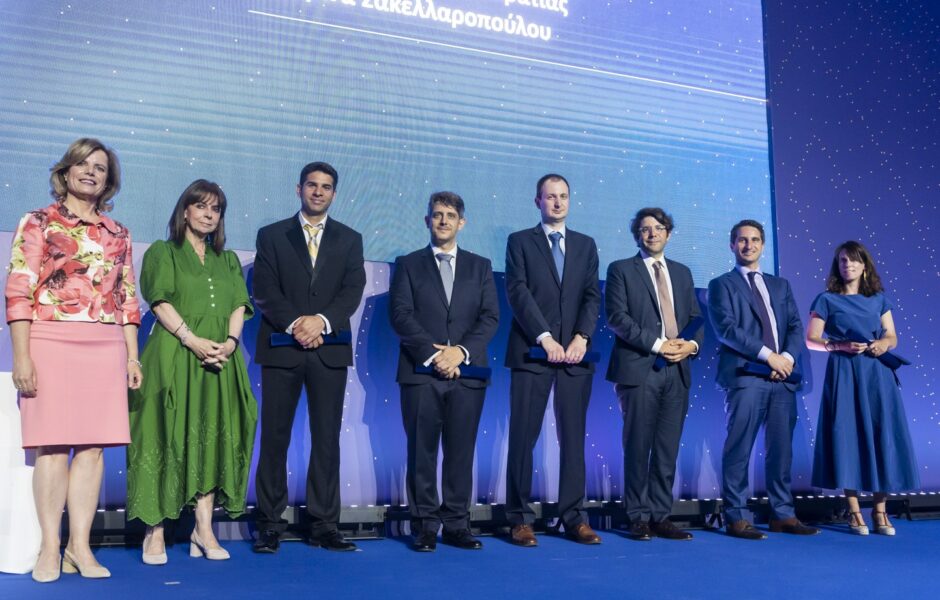The awards were presented to this year’s 6 outstanding young scientists by H.E. the President of the Hellenic Republic Katerina Sakellaropoulou
The Bodossaki Distinguished Young Scientist Awards were presented to their recipients by H.E. the President of the Republic Katerina Sakellaropoulou on Thursday, 16 June, during a special ceremony held at Zappeion Megaron. The six award recipients distinguished themselves for their outstanding contribution to the development of knowledge in key scientific fields and for promoting the Greek creative spirit in the international scientific community.
Alongside scientific excellence, this year’s ceremony also celebrated the Foundation’s 50th anniversary, as it coincided with the completion of five decades of Bodossaki Foundation’s contribution to society. 50 years of donations, programs and initiatives driven by the vision of a society of equal opportunities for all, which enables people to fully realise their potential. 50 years of supporting education, strengthening healthcare, protecting the environment and empowering Civil Society – the Foundation’s four strategic action pillars. In her speech, the President of the Foundation’s Board of Trustees, Athina Dessypri, said about this anniversary: “Celebrating 50 years of work, we, the Foundation’s people today, pledge to continue to develop and expand our activities for the benefit of society, with the same passion, dedication and responsibility. Over the last few years, the Foundation has already been transformed from a Foundation of the classical type, which manages its assets and finances its actions, into a Foundation that is open to society and also functions as a mechanism assisting in the implementation of third-party grants of a public benefit nature.” To watch the anniversary video, click here.
The Bodossaki Distinguished Young Scientist Awards 2021 were presented to the following scientists, by scientific field, In recognition of their scientific excellence:
Life Sciences: Biomedical Science
- Christos Kyratsous, Senior Vice President of Research at Regeneron Pharmaceuticals Inc.
- Thales Papagiannakopoulos, Associate Professor and Director of the Molecular Oncology and Tumor Immunology Training Program, Department of Pathology at the NYU School of Medicine
Science: Mathematics
- Stefanos Aretakis, Associate Professor of Pure Mathematics at the University of Toronto
- Themistocles Sapsis, Professor of Mechanical and Ocean Engineering in the Department of Mechanical Engineering at MIT | Institute for Data, Systems and Society (IDSS) | Centre for Computational Science and Engineering (CCSE)
Social-Economic Sciences: Economics, Political Science, Law
- Myrto Kalouptsidi, Associate Professor of Economics at Harvard University
Applied Science / Technology: Alternative and Renewable Energy, Environmental and Natural Resources Management, Low Carbon Emission Technologies, Energy Efficiency and Conservation
- Antonios Papavassiliou, Assistant Professor at the School of Electrical and Computer Engineering of the National Technical University of Athens
Present at the Award Presentation Ceremony held at Zappeion Megaron were personalities from the academic and scientific community, as well as from culture, the business community and the Civil Society, who also followed the short presentations made by the Award recipients.
Stefanos Aretakis focused on the importance of analysing the dynamics of black holes. In a series of ground-breaking research papers, Aretakis mathematically proved the existence of a new instability of the so-called “extreme” Black Holes, which was named “Aretakis instability” and is now the subject of studies in Physics. In concluding his speech, he quoted a message from Einstein to his son: “Life is like riding a bicycle. To keep your balance, you must keep moving.” But he went on to add that “we have to move forward because it is only then that the balance of the bicycle is stable, yet this does not mean that instability does not have its usefulness sometimes too.”
Themistocles Sapsis about spoke about predicting and understanding, by employing a rigorous strict mathematical methodology, extreme natural phenomena, events with very limited predictability and inherent uncertainty, such as extreme phenomena in the oceans. He ended his presentation with the words of Immanuel Kant: “Someone’s intelligence can be measured by the quantity of uncertainties he can bear.”
Christos Kyratsous presented the work involved in the treatment of viral diseases such as Ebola and SARS-COV-2 with new powerful medicines, among which a cocktail of antibodies for treating the early stages of infection with SARS-COV-2: “I am fortunate to be running a team that has developed two drugs for viral infections – an antibody cocktail for Ebola and the antibody cocktail against COVID-19. We’re studying how we can isolate powerful monoclonal antibodies for using them as antiviral drugs, and how we can use and develop new technologies to test antibodies in clinical trials within a very short time, in order to deal with epidemics or pandemics.”
Thales Papagiannakopoulos described his work in the field of the mechanics of the cancer genome and its metabolism. His approach bridges the gap between cancer biology and immunology. “Metabolism is an important process for cancer cells, allowing them to be able to create new cells. Without increased metabolism, cancer cells cannot proliferate. One of the important discoveries in our laboratory is the proof that using targeted therapies, which suppress tumour metabolism, we can suppress oncogenesis.”
Antonis Papavassiliou presented the applications of his research in the rational use of energy resources and the large-scale penetration of renewable energy sources in electricity systems. “Operational research, which I am involved in, develops models and algorithms that help make decisions in complex systems, such as the control centre of the Independent Power Transmission Operator (IPTO) for the daily production planning of our country’s power plants. Combined with the tremendous increase in the computing power of computers and with our supercomputers, we can solve major problems at acceptable times. Working in the field of operational research, I have the luxury of being able to use something beautiful –mathematics– for something very tangible: the functioning of energy systems in different countries across the world.”
Myrto Kalouptsidi presented some of the key results of her innovative research in applied microeconomics and the role of transport and infrastructure in international trade. “The question that concerned me was how transport markets affect international trade and why they can cause such great disruption. The combination of data collected from ship monitoring satellites and antennas, with a theoretical quantitative model describing how transport markets behave, gives us a new perspective for looking at the global economy. We try to answer both traditional and modern-day questions: How are macroeconomic shocks spreading? Is the transport market working effectively?”
“Over the years, Bodossaki Foundation has been fanatically committed to supporting education, meritocracy and scientific excellence. The evolution of the institution of the Bodossaki Distinguished Young Scientist Awards fills us with optimism, as it proves that Greek scientists produce top-quality research and scientific work that is recognized and established internationally. These young scientists are prime ‘role models’ for the younger generations and a source of pride for all of us. With their excellent scientific background, they are the best ambassadors of Greece abroad,” said Athena Dessypri, President of Bodossaki Foundation’s Board of Trustees.
The institution of the Distinguished Young Scientist Awards is part of Bodossaki Foundation’s public benefit objectives for promoting education and was first established in 1992. With these awards, the Foundation has so far acknowledged 57 outstanding young Greek scientists who are leading research worldwide, supporting their commitment and continuous efforts for scientific excellence and honouring them as role models for the Greek society as a whole.

